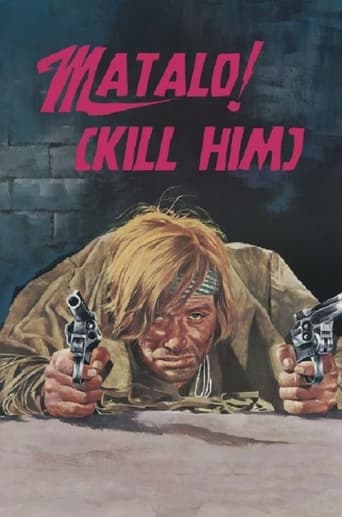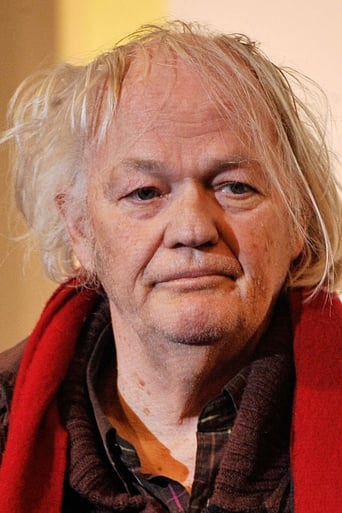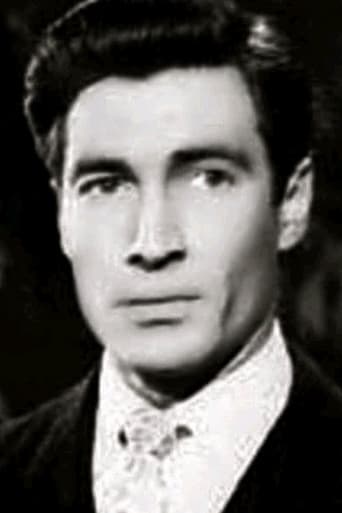Matcollis
This Movie Can Only Be Described With One Word.
AniInterview
Sorry, this movie sucks
Chirphymium
It's entirely possible that sending the audience out feeling lousy was intentional
Wizard-8
If you get the American DVD of this movie, you'll see on the back of the box that the manufacturer states that MATALO! is "...perhaps the strangest spaghetti western ever made and an exercise in style over content." To put it mildly! This movie seems to have been directed by an insane mind. There were a few things I liked about it. There are some striking images (the sun shining in the camera, a priest being surrounded by a ring of riders, etc.), and the electronic score by Mario Migliardi is very memorable with its electronic tones (including electric guitars) and traditional spaghetti western tones such as bells. The boomerang climax is also memorable.Unfortunately, despite a few good elements like these, I didn't overall care for this movie - and I usually like spaghetti westerns. The movie is very slow-moving, and the characters mostly act alike (and are also mostly confusing in their plans and schemes). Frankly, I was exhausted by the end by the movie's relying on flashy camera movements to cover up that nothing much was happening. Even if you are a spaghetti western lover like I am, you would be better off rewatching one of your favorite spaghetti westerns than take a look at this.
unbrokenmetal
At the beginning of the movie, Bart (Corrado Pani) is about to be hanged. With a grin, he sticks his head through the noose. Soon we see the reason for his happiness: bandits attack the town and rescue him. Bart watches a widow (probably of his latest victim) shoot herself after he kissed her, but he doesn't care at all. Later he murders his rescuers in cold blood and teams up with Theo (Antonio Salines) and Philip (Luis Davila). They arrive in Benson City, a ghost town, and meet Philip's love interest Mary (Claudia Gravy). They steal a box full of gold from a stagecoach - Bart, the protagonist so far, is casually shot there - and hide in the deserted town again for a couple of days. But Theo, Philip and Mary are not alone. The last inhabitant, the old Mrs Benson, still lives there, and Ray (Lou Castel), a boyish stranger, arrives with a woman who survived an accident in the desert. When Mrs Benson offers Ray a gun to fight against the bandits, he tells her he never fired a gun before... but he's got boomerangs."Matalo" is not just a movie - it's an unforgettable experience. Directed by Cesare Canevari, Mario Migliardi had the freedom to experiment with the soundtrack which has many distorted strange noises and a psychedelic guitar playing which is obviously contemporary to Jimi Hendrix. You can count the dialog scenes in the movie by the fingers of one hand. Even if people talk, it is often not a convenient exchange of information for the audience, but a meaningless distraction, for example in the scene when Mary teases Theo by showing her leg, while Philip boasts about all the gold they stole. Bart says: "It is easier to love God than your next one, because God doesn't cheat" (in the original: "E più facile amare Dio che il prossimo perché Dio non ti frega mai"). Bart is often laughing to himself, as if he told a secret joke to himself - more likely, he is amused at the absurdity of his existence. If somebody shoots, it's not the aim, it's the sensuality of the action that matters. Bart loves to smell the smoke of his gun after he fired. Before the stagecoach robbery, Bart and Philip don't discuss their plan like they would do in an ordinary movie. Often it is not important what is shown, but what is not shown, because that questions your habits as a viewer. After Julio Ortas' camera turned in circles, we see bodies on the ground. Who killed whom? Never mind. We all must die. God doesn't cheat.
MARIO GAUCI
This one emerges an outstanding, if eccentric, Spaghetti Western which certainly gives that notorious genre effort DJANGO, KILL...IF YOU LIVE, SHOOT! (1967) a run for its money in the weirdness stakes! Though simply enough plotted - with the script itself admirably laconic - and effectively set (for the most part) in a ghost town, it's essentially a mood-piece: stylized to a fault, the film features virtuoso camera-work and bold editing throughout; still, the general tone - buoyed by the remarkable experimental electro-rock sounds created by one Mario Migliardi - is effortlessly hypnotic.The cast is equally interesting: Spaghetti Western regular Lou Castel as the unlikely hero (who, admitting to be unskilled at handling guns, utilizes boomerangs for weaponry during the body-strewn climax!); Corrado Pani - surely one of the genre's most idiosyncratic villains - brings a topical, i.e. late 1960s, touch of hippiedom to the Old West (the film is, however, thankfully free of the politics which informed many latter-day similar efforts)! Incidentally, both these top-billed stars are off-screen for an inordinate length of time - thus allowing Claudia Gravy, the luscious female lead, to take centre-stage (no complaints there!).Pani's sidekicks, then, are equally colorful: one is Gravy's current lover, who assumes leadership of the gang after Pani's untimely 'exit' early on, and the other a sadist who covets the girl (though she continually rejects his advances). In fact, for a film of its type, there's an unusual emphasis on sex here - as much to the fore, I'd say, as the violence...which is present in quite graphic fashion (the sadistic outlaw beats Castel repeatedly with a chain, but he later has his own hand trampled by horse's hooves!).Regrettably, the film is only available on DVD in an English-dubbed version through Wild East; the fact that the original language is not included would normally be enough to dissuade me from acquiring it (in spite of an accompanying Lou Castel interview which ought to be interesting) - but my recent unhappy experience with Wild East's edition of another Spaghetti Western title, THE MAN FROM NOWHERE (1966), certainly doesn't help make a case for it...
Mario Pio
i LIKE MOVIES THAT MAKE ME STRANGE SENSATION!According to Mereghetti's dictionary of movies, this western is "as a Leone at last in mescalina" and with some moments that reminds Monte Hellman's movies for the use of the empty moments. This movie seems to me an august nightmare, with the hot, the desolation and the wonderful state of madness that characterized the end of the summer. Also notable is the score of Mario Mingardi, a mix of Jimi Hendrix and Luciano Berio, with electronics that supplies dialogues. I think that in western there is nothing like the duel of Matalo, a pistol against boomerangs! Recommended for all who like strange movies in the heart of the night with a little drop of alcohol or something else!








